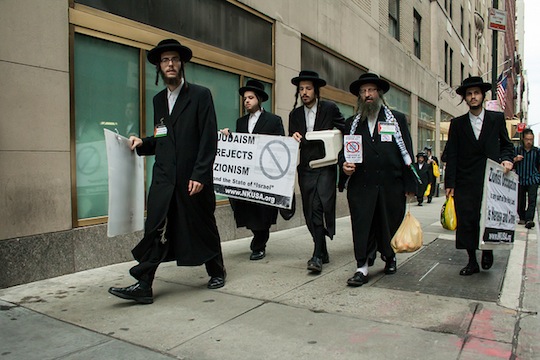Neturei Karta, a small ultra-Orthodox sect that rejects the existence of a Jewish national movement, is embraced by Palestinians because of its opposition to Zionism. However, its radical approach does not serve Palestinians in their national struggle.
By Eldad Levy
Throughout the last round of violence in Gaza and the south of Israel, Facebook was flooded with Palestinian and Israeli support campaigns. The campaign of Neturei Karta, the most famous Hassidic sect that opposes Zionism, was among the most interesting ones. Facebook users often share pictures of Neturei Karta in their traditional black clothing, often wearing a keffiyeh decorated with Palestinian flags; by being both unquestionably Jewish and fervent supporters of the Palestinian national movement, Neturei Karta has become one of the most iconic allies of the Palestinian struggle. Many find surprising the existence of a group of Hassidic Jews who stand firmly with the Palestinians against the state of Israel.
In order to understand why Neturei Karta support the Palestinians struggle we need to examine their roots: historically, Neturei Karta had split from Agudas Yisrael, a much larger Ashkenazi Orthodox organization from the late 1930s, which was then a major opponent of Zionism that would ultimately reassess its opposition to the state of Israel. Neturei Karta however, remains a zealous opponent of the Zionist movement since it believes the exile of the Jews can only be redeemed with the arrival of the Messiah and that any attempt to establish a Jewish state is an affront to God’s will.
Therefore, it claims, the state of Israel and all its institutions should be resisted or at the very least ignored. Today there are only a few thousand Neturei Karta members around the world. The vast majority of them take minimal or no part in the daily life of Israeli society and only a handful takes an actual part in the struggle against the existence of Israel. Those who do however, are very vocal about it: it’s easy to recall Moshe Hirsch, the leader of the radical branch of Neturei Karta who served in Yasser Arafat’s cabinet as “Minister of Jewish affairs.” The most renowned action of the group was probably the participation of members of Neturei Karta in the “International Conference to Review the Global Vision of the Holocaust,” hosted by Iranian President Mahmoud Ahmadinejad.
The popularity of Neturei Karta among Palestinians is based on this fundamental resistance to Zionism. They don’t just oppose Israeli occupation of Palestinian lands or Israeli policies – they oppose the mere existence of Israel or the idea that Jews should even have a national movement. That stance places them among the “purest” and most radical opponents of Zionism. Moreover, the fact that a rigorous Jewish sect officially denounces the existence of Israel and joins efforts with the Palestinian national struggle has a symbolic political gain that exceeds the actual efforts of the group towards the Palestinian struggle. The use of Neturei Karta as “Jews opposing Israel” is heavily tokenized to achieve a political goal.
There are only about 100 members of Neturei Karta that actually take part in the political struggle. There are probably many more thousands of secular Jews around the world who sympathize with the Palestinian struggle – Jews who look much more like secular Muslim and Christian Palestinians and therefore cannot be tokenized by their appearance. Indeed, regardless of the “Jewish image” Palestinians have of Neturei Karta, the vast majority of Israelis or Jews around the world would find it impossible to identify with their fundamentalist, radical message.
The fact that most Jews or Israelis don’t feel Neturei Karta represents them is of course not a good enough reason to disqualify them. However, the reasons for which Naturei Karta so passionately join the Palestinian nation struggle are. For Palestinians who support them, the enemy of their enemy is naturally their friend, but they don’t seem to question the reasons why Neturei Karta joins their struggle. Neturei Karta’s worldview is shaped by their opposition to Jewish self-determination, not support for Palestinian self-determination. Similar to Evangelical Christian support of radical right-wing Israeli groups, Neturei Karta’s support of Palestinians is based on fundamentalist views and not on actual ideological identification with the Palestinian struggle. Both of these Messianic forces will take on any type of ideological form to promote their own fatalistic worldview.
In a sense, Neturei Karta is the equivalent of Palestinians in Israel who define themselves as Zionist – like the recently published story of IDF Major Alaa’ Wahib, a Muslim Zionist. The fact that a few Palestinians align themselves fully with Israel teaches us little of the complexity of the Palestinian position. While acknowledging their stance is important, the political discourse tokenizes them to exempt the larger Israeli public from grappling with why Palestinians reject Zionism. By the same token, Neturei Karta members are presented as model Jews: without national ambitions and fully aligned with the Palestinian struggle.
In the political arena, Palestinians could probably find better and more effective allies within the Israeli secular and even religious society, or within Jewish communities around the world. These allies may not be radical opponents of Zionism, but they will better reflect the fact that Israel’s existence has wide support among Jewish communities, even if Israel’s policies don’t always enjoy the same support. This would mark a positive change, from shifting the alliance of the Palestinian struggle with fundamentalist forces, to one with democratic and ideological ones.
Eldad J. Levy is director of Seeds of Peace in Israel and a Master’s student in the political sociology department at Haifa University. The opinions expressed here are his own.

